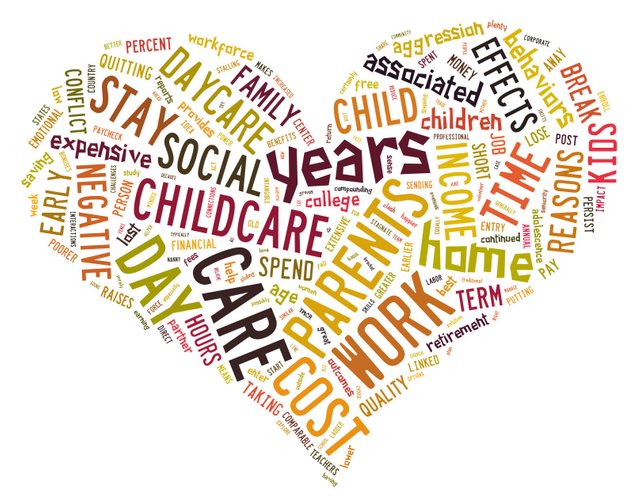Is Working Worth It When You Have Kids?
The time children spend in day care is associated with negative effects in social development. More hours in day care during a child’s early years is associated with less social competence and cooperation, more problem behaviors, negative mood, aggression, and conflict.
Negative effects of day care on social–emotional development persist throughout early childhood and adolescence. Day care is linked with poorer average outcomes when children spend more time in center care, enter day care at an earlier age, or are in lower-quality care.
However, in some parts of the country, putting a child through daycare can cost more than sending them to college. The annual childcare fees amount to $15,000 in some states. That means it could be cheaper to enroll your 4-year-old in a four year public college than daycare.

When you start to weigh the long term benefits against a weekly paycheck, sometimes staying at home to take care of your kids makes sense.
Is the short term expense of daycare reason enough for parents to quit their job? There are plenty of reasons why it is not a great idea to take a break from the workforce –
* Direct income loss: By taking a break of 5 years, what is the amount lost by not saving for retirement in 401k for those years? How much is the income loss in those 5 years? What is the cost of compounding all this income loss for 30 years until retirement at 7 percent return?
* Promotions and income loss from that: Taking a 5 year break will most certainly be a career stalling act. Where would you be in the corporate ladder if you had worked through those 5 years? How much would your salary have increased due to promotions, bonuses and pay raises?
* Other intangible losses: By staying at home you not only lose money, but skills stagnate, seniority is lost and connections fall away. What about any other opportunity costs?
* Personality clash: Staying at home to care for kids is not for everyone. Some parents are much better parents because they work outside home. They are much happier with having workplace interactions, professional challenges and generally love their career.
Stepping away from the workforce to care for your kids will save money in the short term, but is that best for your family in the long run?

Options to possibly help cost and career
Childcare is expensive, but quitting your job is equally or even more expensive, especially if you are a career-minded person. You can explore several other avenues to reduce the cost of childcare:
* If you have family who can provide free or low cost childcare, that might work for a part-time solution.
* Can you team up with other parents and share a nanny?
* Do you have a YMCA (or something similar) that provides childcare on a sliding cost basis? If you are in the low income bracket, you might pay next to nothing for someone to care for your child.
* Try a co-op daycare. These are typically church or community groups where you have to volunteer for one day a week to get childcare for one week (other parents do the same).
* Can you manage your shifts with your partner so that one partner works during the day, the other at night?
* Can you work from home and hire a mother’s helper?
* If you work part-time, can you trade care with another mom working part-time?
A lot of families choose to have one parent stay at home to raise the kids until they go to school not for financial reasons but because they believe that is what is best for their families. This post is not about whether one should stay at home or work; rather this post is to help people who are on the fence about going back to work purely for financial reasons. In that case, look at the big picture, not just the first few years but a few decades down the line and plan ahead.
@stackcats
I have an even more important question.
Is it worth it to work for kids?
Are you asking, is it worth it to maintain employment so that your children have the benefits that a job can provide?
Such a difficult decision. Especially if you decide something different than how you grew up.
If one parent can work from home really helps this decision.
I agree. But for those in single parent homes, the decision can be that much more difficult.